Minolta 163, 211, 220 Service manual
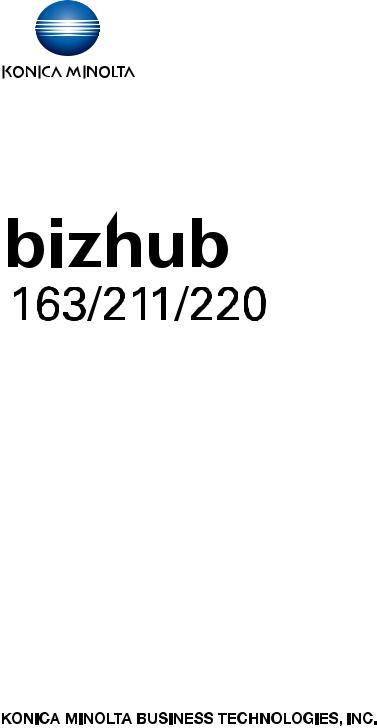
SERVICE MANUAL |
FIELD SERVICE |
|
|
|
|
|
|
|
|
|
|
2007.04 Ver. 1.0

FIELD SERVICE TOTAL CONTENTS |
|
SAFETY AND IMPORTANT WARNING ITEMS .............................................................. |
S-1 |
IMPORTANT NOTICE ................................................................................................ |
S-1 |
DESCRIPTION ITEMS FOR DANGER, WARNING AND CAUTION ......................... |
S-1 |
SAFETY WARNINGS ................................................................................................. |
S-2 |
WARNING INDICATIONS ON THE MACHINE ........................................................ |
S-18 |
MEASURES TO TAKE IN CASE OF AN ACCIDENT .................................................... |
S-19 |
Composition of the service manual ................................................................................. |
C-1 |
Notation of the service manual ....................................................................................... |
C-2 |
bizhub 163/211/220 Main body |
|
General ........................................................................................................................... |
1 |
Maintenance ................................................................................................................... |
7 |
Adjustment/Setting........................................................................................................ |
95 |
Troubleshooting........................................................................................................... |
153 |
Appendix..................................................................................................................... |
199 |
FK-506 |
|
General ........................................................................................................................... |
1 |
Maintenance ................................................................................................................... |
3 |
Adjustment/Setting........................................................................................................ |
13 |
Troubleshooting........................................................................................................... |
117 |
DF-605/MK-501 |
|
General ........................................................................................................................... |
1 |
Maintenance ................................................................................................................... |
5 |
Adjustment/Setting........................................................................................................ |
21 |
Troubleshooting............................................................................................................. |
31 |
DF-502 |
|
General ........................................................................................................................... |
1 |
Maintenance ................................................................................................................... |
3 |
Adjustment/Setting........................................................................................................ |
17 |
Troubleshooting............................................................................................................. |
27 |
AD-504 |
|
General ........................................................................................................................... |
1 |
Maintenance ................................................................................................................... |
3 |
Adjustment/Setting........................................................................................................ |
11 |
Troubleshooting............................................................................................................. |
13 |
i

PF-502 |
|
General........................................................................................................................... |
1 |
Maintenance ................................................................................................................... |
3 |
Adjustment/Setting ....................................................................................................... |
11 |
Troubleshooting ............................................................................................................ |
17 |
MB-501 |
|
General........................................................................................................................... |
1 |
Maintenance ................................................................................................................... |
3 |
Adjustment/Setting ....................................................................................................... |
19 |
Troubleshooting ............................................................................................................ |
25 |
JS-503 |
|
General........................................................................................................................... |
1 |
Maintenance ................................................................................................................... |
3 |
Troubleshooting ............................................................................................................ |
11 |
SF-501 |
|
General........................................................................................................................... |
1 |
Maintenance ................................................................................................................... |
3 |
Troubleshooting .............................................................................................................. |
9 |
IC-206/NC-503 |
|
General........................................................................................................................... |
1 |
Maintenance ................................................................................................................... |
3 |
Adjustment/Setting ....................................................................................................... |
11 |
Troubleshooting ............................................................................................................ |
21 |
ii
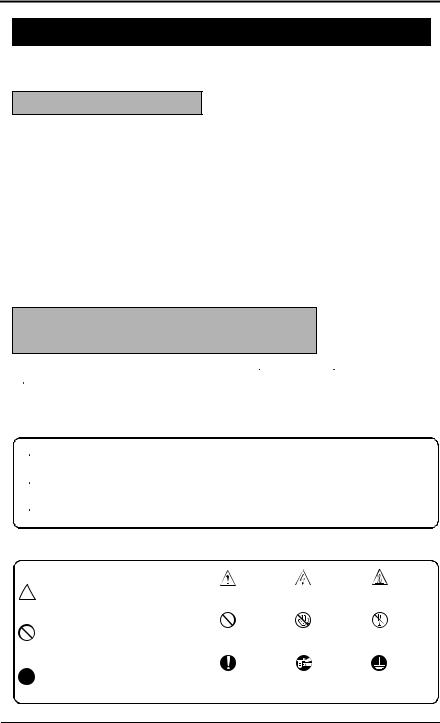
SAFETY AND IMPORTANT WARNING ITEMS
SAFETY AND IMPORTANT WARNING ITEMS
Read carefully the safety and important warning items described below to understand them before doing service work.
IMPORTANT NOTICE
Because of possible hazards to an inexperienced person servicing this product as well as the risk of damage to the product, KONICA MINOLTA BUSINESS TECHNOLOGIES, INC. (hereafter called the KMBT) strongly recommends that all servicing be performed only by KMBT-trained service technicians.
Changes may have been made to this product to improve its performance after this Service Manual was printed. Accordingly, KMBT does not warrant, either explicitly or implicitly, that the information contained in this service manual is complete and accurate.
The user of this service manual must assume all risks of personal injury and/or damage to the product while servicing the product for which this service manual is intended. Therefore, this service manual must be carefully read before doing service work both in the course of technical training and even after that, for performing maintenance and control of the product properly.
Keep this service manual also for future service.
DESCRIPTION ITEMS FOR DANGER,
WARNING AND CAUTION
In this Service Manual, each of three expressions “ DANGER”, “
DANGER”, “ WARNING”, and “
WARNING”, and “  CAUTION” is defined as follows together with a symbol mark to be used in a limited meaning.
CAUTION” is defined as follows together with a symbol mark to be used in a limited meaning.
When servicing the product, the relevant works (disassembling, reassembling, adjustment, repair, maintenance, etc.) need to be conducted with utmost care.
 DANGER: Action having a high possibility of suffering death or serious injury
DANGER: Action having a high possibility of suffering death or serious injury
 WARNING: Action having a possibility of suffering death or serious injury
WARNING: Action having a possibility of suffering death or serious injury
 CAUTION: Action having a possibility of suffering a slight wound, medium trouble, and property damage
CAUTION: Action having a possibility of suffering a slight wound, medium trouble, and property damage
Symbols used for safety and important warning items are defined as follows:
:Precaution when servicing the
|
product. |
General |
Electric hazard |
High temperature |
||||||
|
|
precaution |
|
|
|
|
|
|
||
|
:Prohibition when servicing the |
|
|
|
|
|
|
|
|
|
|
|
|
|
|
|
|
|
|
|
|
|
|
|
|
|
|
|
|
|
|
|
|
|
General |
|
|
|
|
|
|
||
|
product. |
Do not touch |
Do not |
|||||||
|
|
prohibition |
with wet hand |
disassemble |
||||||
|
:Direction when servicing the |
|
|
|
|
|
|
|
|
|
|
|
|
|
|
|
|
|
|
|
|
|
|
|
|
|
|
|
|
|
|
|
|
General |
Unplug |
Ground/Earth |
|||||||
|
product. |
|||||||||
|
instruction |
|
|
|
|
|
|
|||
|
|
|
|
|
|
|
|
|||
S-1
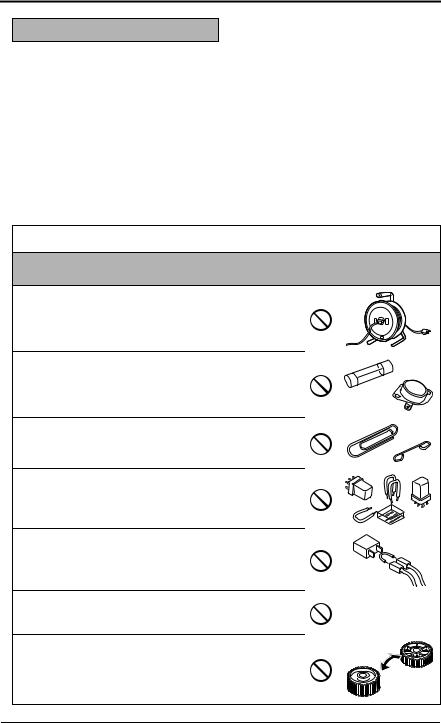
SAFETY AND IMPORTANT WARNING ITEMS
SAFETY WARNINGS
[1]MODIFICATIONS NOT AUTHORIZED BY KONICA MINOLTA BUSINESS TECHNOLOGIES, INC.
KONICA MINOLTA brand products are renowned for their high reliability. This reliability is achieved through high-quality design and a solid service network.
Product design is a highly complicated and delicate process where numerous mechanical, physical, and electrical aspects have to be taken into consideration, with the aim of arriving at proper tolerances and safety factors. For this reason, unauthorized modifications involve a high risk of degradation in performance and safety. Such modifications are therefore strictly prohibited. the points listed below are not exhaustive, but they illustrate the reasoning behind this policy.
Prohibited Actions
 DANGER
DANGER
• Using any cables or power cord not specified by KMBT.
• Using any fuse or thermostat not specified by KMBT. Safety will not be assured, leading to a risk of fire and injury.
• Disabling fuse functions or bridging fuse terminals with wire, metal clips, solder or similar object.
• Disabling relay functions (such as wedging paper between relay contacts)
• Disabling safety functions (interlocks, safety circuits, etc.) Safety will not be assured, leading to a risk of fire and injury.
• Making any modification to the product unless instructed by KMBT
• Using parts not specified by KMBT
S-2
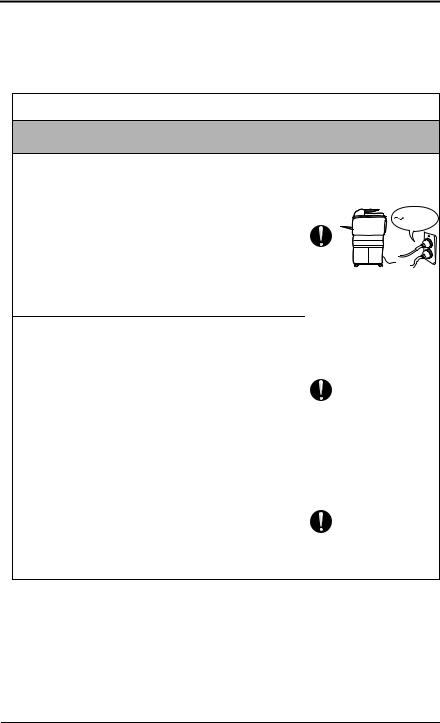
SAFETY AND IMPORTANT WARNING ITEMS
[2] POWER PLUG SELECTION
In some countries or areas, the power plug provided with the product may not fit wall outlet used in the area. In that case, it is obligation of customer engineer (hereafter called the CE) to attach appropriate power plug or power cord set in order to connect the product to the supply.
Power Cord Set or Power Plug
 WARNING
WARNING
•Use power supply cord set which meets the following criteria:
-provided with a plug having configuration intended for the connection to wall outlet appropriate for the prod-
kw
uct's rated voltage and current, and
- the plug has pin/terminal(s) for grounding, and
- provided with three-conductor cable having enough current capacity, and
-the cord set meets regulatory requirements for the area. Use of inadequate cord set leads to fire or electric shock.
•Attach power plug which meets the following criteria:
-having configuration intended for the connection to wall outlet appropriate for the product's rated voltage and current, and
- the plug has pin/terminal(s) for grounding, and - meets regulatory requirements for the area.
Use of inadequate cord set leads to the product connecting to inadequate power supply (voltage, current capacity, grounding), and may result in fire or electric shock.
•Conductors in the power cable must be connected to terminals of the plug according to the following order:
•Black or Brown:L (line)
•White or Light Blue:N (neutral) •Green/Yellow:PE (earth)
Wrong connection may cancel safeguards within the product, and results in fire or electric shock.
S-3
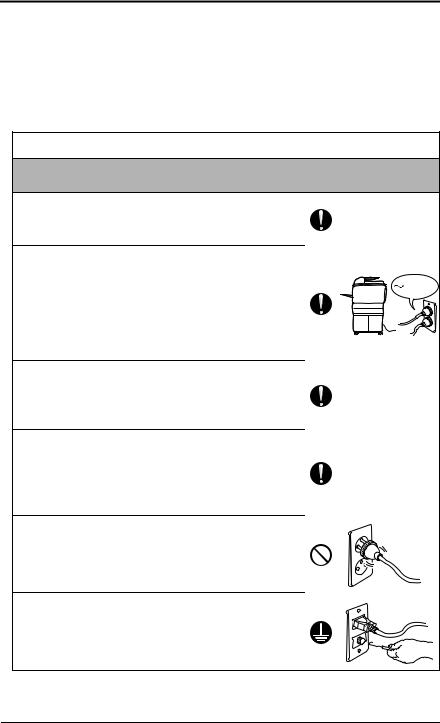
SAFETY AND IMPORTANT WARNING ITEMS
[3] CHECKPOINTS WHEN PERFORMING ON-SITE SERVICE
KONICA MINOLTA brand products are extensively tested before shipping, to ensure that all applicable safety standards are met, in order to protect the customer and customer engineer (hereafter called the CE) from the risk of injury. However, in daily use, any electrical equipment may be subject to parts wear and eventual failure. In order to maintain safety and reliability, the CE must perform regular safety checks.
1.Power Supply
Connection to Power Supply
 WARNING
WARNING
• Check that mains voltage is as specified.
Connection to wrong voltage supply may result in fire or electric shock.
•Connect power plug directly into wall outlet having same configuration as the plug.
Use of an adapter leads to the product connecting to |
kw |
inadequate power supply (voltage, current capacity, |
|
grounding), and may result in fire or electric shock. |
|
If proper wall outlet is not available, advice the customer |
|
to contact qualified electrician for the installation. |
|
•Plug the power cord into the dedicated wall outlet with a capacity greater than the maximum power consumption.
If excessive current flows in the wall outlet, fire may result.
•If two or more power cords can be plugged into the wall outlet, the total load must not exceed the rating of the wall
outlet.
If excessive current flows in the wall outlet, fire may result.
• Make sure the power cord is plugged in the wall outlet securely.
Contact problems may lead to increased resistance, overheating, and the risk of fire.
• Check whether the product is grounded properly.
If current leakage occurs in an ungrounded product, you may suffer electric shock while operating the product. Connect power plug to grounded wall outlet.
S-4
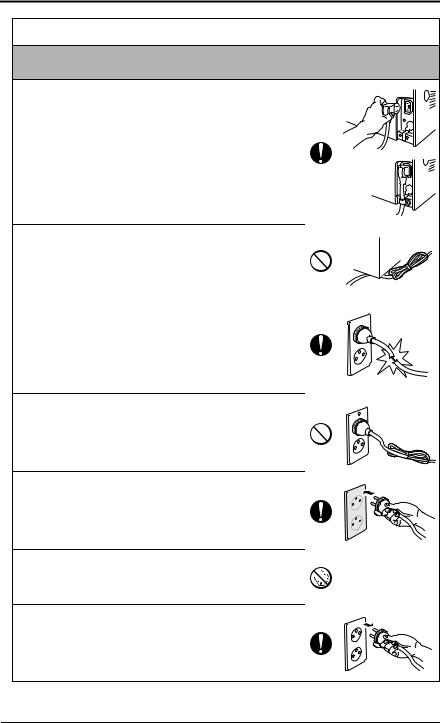
SAFETY AND IMPORTANT WARNING ITEMS
Power Plug and Cord
 WARNING
WARNING
• When using the power cord set (inlet type) that came with this product, make sure the connector is securely inserted in the inlet of the product.
When securing measure is provided, secure the cord with the fixture properly.
If the power cord (inlet type) is not connected to the product securely, a contact problem may lead to increased resistance, overheating, and risk of fire.
•Check whether the power cord is not stepped on or pinched by a table and so on.
Overheating may occur there, leading to a risk of fire.
•Check whether the power cord is damaged. Check whether the sheath is damaged.
If the power plug, cord, or sheath is damaged, replace with a new power cord (with plug and connector on each end) specified by KMBT. Using the damaged power cord may result in fire or electric shock.
• Do not bundle or tie the power cord.
Overheating may occur there, leading to a risk of fire.
• Check whether dust is collected around the power plug and wall outlet.
Using the power plug and wall outlet without removing dust may result in fire.
• Do not insert the power plug into the wall outlet with a wet hand.
The risk of electric shock exists.
• When unplugging the power cord, grasp the plug, not the cable.
The cable may be broken, leading to a risk of fire and electric shock.
S-5
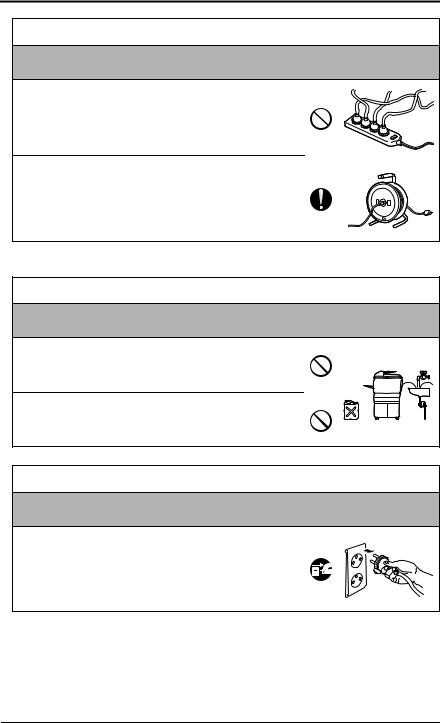
SAFETY AND IMPORTANT WARNING ITEMS
Wiring
 WARNING
WARNING
•Never use multi-plug adapters to plug multiple power cords in the same outlet.
If used, the risk of fire exists.
• When an extension cord is required, use a specified one. Current that can flow in the extension cord is limited, so using a too long extension cord may result in fire.
Do not use an extension cable reel with the cable taken up. Fire may result.
2.Installation Requirements
Prohibited Installation Places
 WARNING
WARNING
• Do not place the product near flammable materials or volatile materials that may catch fire.
A risk of fire exists.
• Do not place the product in a place exposed to water such as rain.
A risk of fire and electric shock exists.
When not Using the Product for a long time
 WARNING
WARNING
• When the product is not used over an extended period of time (holidays, etc.), switch it off and unplug the power cord.
Dust collected around the power plug and outlet may cause fire.
S-6
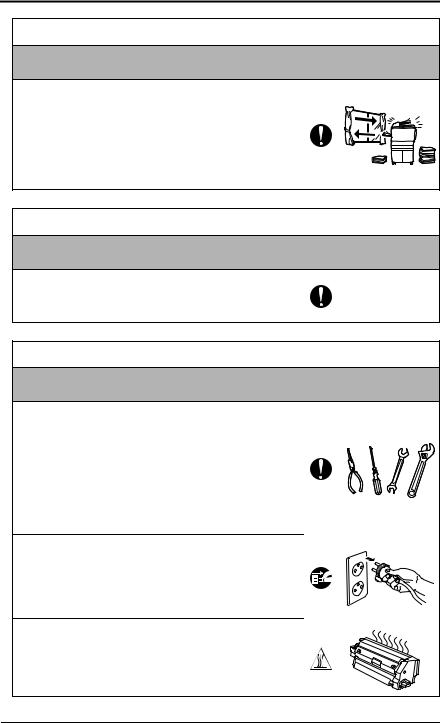
SAFETY AND IMPORTANT WARNING ITEMS
Ventilation
 CAUTION
CAUTION
•The product generates ozone gas during operation, but it will not be harmful to the human body.
If a bad smell of ozone is present in the following cases, ventilate the room.
a. When the product is used in a poorly ventilated room b. When taking a lot of copies
c. When using multiple products at the same time
Stability
 CAUTION
CAUTION
• Be sure to lock the caster stoppers.
In the case of an earthquake and so on, the product may slide, leading to a injury.
Inspection before Servicing
 CAUTION
CAUTION
•Before conducting an inspection, read all relevant documentation (service manual, technical notices, etc.) and proceed with the inspection following the prescribed pro-
cedure in safety clothes, using only the prescribed tools. Do not make any adjustment not described in the documentation.
If the prescribed procedure or tool is not used, the product may break and a risk of injury or fire exists.
• Before conducting an inspection, be sure to disconnect the power plugs from the product and options.
When the power plug is inserted in the wall outlet, some units are still powered even if the POWER switch is turned OFF. A risk of electric shock exists.
•The area around the fixing unit is hot. You may get burnt.
S-7
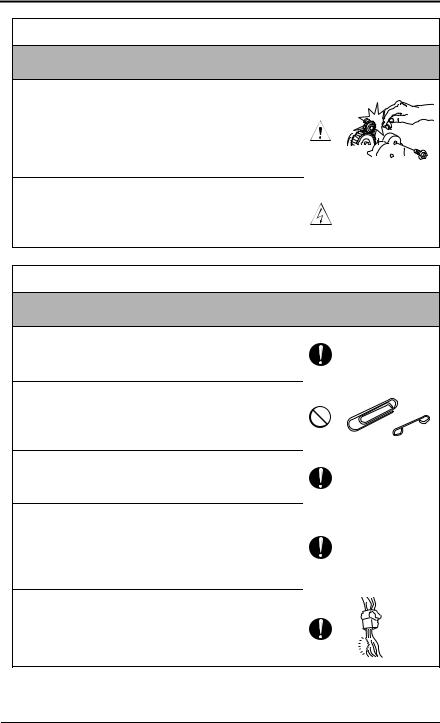
SAFETY AND IMPORTANT WARNING ITEMS
Work Performed with the Product Powered On
 WARNING
WARNING
• Take every care when making adjustments or performing an operation check with the product powered.
If you make adjustments or perform an operation check with the external cover detached, you may touch live or high-voltage parts or you may be caught in moving gears or the timing belt, leading to a risk of injury.
•Take every care when servicing with the external cover detached.
High-voltage exists around the drum unit. A risk of electric shock exists.
Safety Checkpoints
 WARNING
WARNING
• Check the exterior and frame for edges, burrs, and other damage.
The user or CE may be injured.
•Do not allow any metal parts such as clips, staples, and screws to fall into the product.
They can short internal circuits and cause electric shock or fire.
• Check wiring for squeezing and any other damage. Current can leak, leading to a risk of electric shock or fire.
• Carefully remove all toner remnants and dust from electrical parts and electrode units such as a charging corona unit.
Current can leak, leading to a risk of product trouble or fire.
• Check high-voltage cables and sheaths for any damage. Current can leak, leading to a risk of electric shock or fire.
S-8
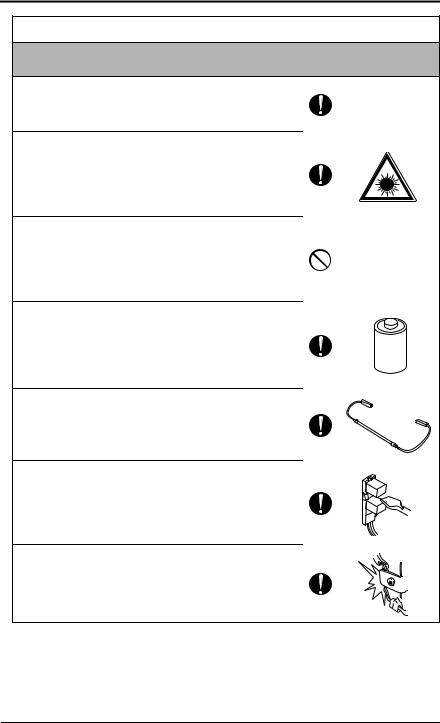
SAFETY AND IMPORTANT WARNING ITEMS
Safety Checkpoints
 WARNING
WARNING
• Check electrode units such as a charging corona unit for deterioration and sign of leakage.
Current can leak, leading to a risk of trouble or fire.
•Before disassembling or adjusting the write unit (P/H unit) incorporating a laser, make sure that the power cord has
been disconnected.
The laser light can enter your eye, leading to a risk of loss of eyesight.
• Do not remove the cover of the write unit. Do not supply power with the write unit shifted from the specified mounting position.
The laser light can enter your eye, leading to a risk of loss of eyesight.
• When replacing a lithium battery, replace it with a new lithium battery specified in the Parts Guide Manual. Dispose of the used lithium battery using the method specified by local authority.
Improper replacement can cause explosion.
•After replacing a part to which AC voltage is applied (e.g., optical lamp and fixing lamp), be sure to check the installation state.
A risk of fire exists.
• Check the interlock switch and actuator for loosening and check whether the interlock functions properly.
If the interlock does not function, you may receive an electric shock or be injured when you insert your hand in the product (e.g., for clearing paper jam).
•Make sure the wiring cannot come into contact with sharp edges, burrs, or other pointed parts.
Current can leak, leading to a risk of electric shock or fire.
S-9
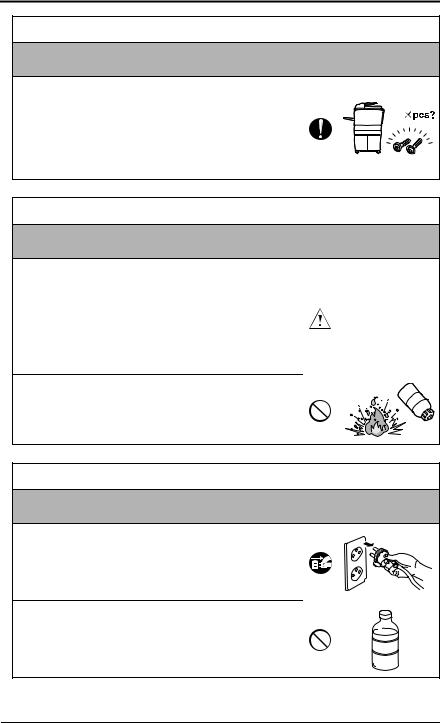
SAFETY AND IMPORTANT WARNING ITEMS
Safety Checkpoints
 WARNING
WARNING
•Make sure that all screws, components, wiring, connectors, etc. that were removed for safety check and maintenance have been reinstalled in the original location. (Pay special attention to forgotten connectors, pinched cables, forgotten screws, etc.)
A risk of product trouble, electric shock, and fire exists.
Handling of Consumables
 WARNING
WARNING
•Toner and developer are not harmful substances, but care must be taken not to breathe excessive amounts or let the substances come into contact with eyes, etc. It may be stimulative.
If the substances get in the eye, rinse with plenty of water immediately. When symptoms are noticeable, consult a physician.
•Never throw the used cartridge and toner into fire. You may be burned due to dust explosion.
Handling of Service Materials
 CAUTION
CAUTION
• Unplug the power cord from the wall outlet.
Drum cleaner (isopropyl alcohol) and roller cleaner (ace- tone-based) are highly flammable and must be handled with care. A risk of fire exists.
•Do not replace the cover or turn the product ON before any solvent remnants on the cleaned parts have fully evaporated.
A risk of fire exists.
S-10
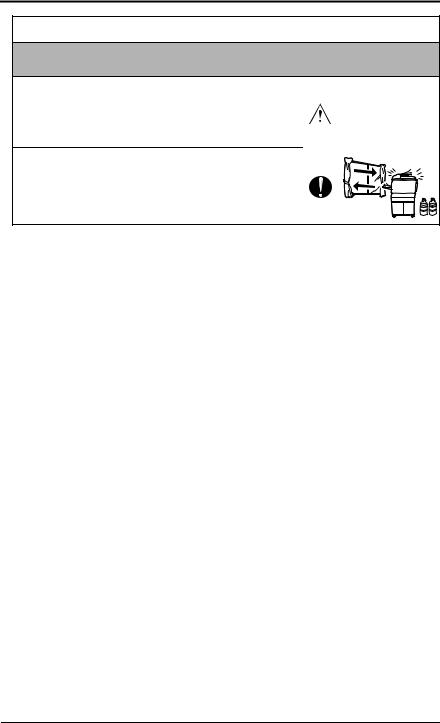
SAFETY AND IMPORTANT WARNING ITEMS
Handling of Service Materials
 CAUTION
CAUTION
•Use only a small amount of cleaner at a time and take care not to spill any liquid. If this happens, immediately
wipe it off.
A risk of fire exists.
• When using any solvent, ventilate the room well. Breathing large quantities of organic solvents can lead to discomfort.
S-11

SAFETY AND IMPORTANT WARNING ITEMS
[4] Used Batteries Precautions
ALL Areas
CAUTION Danger of explosion if battery is incorrectly replaced.
Replace only with the same or equivalent type recommended by the manufacturer. Dispose of used batteries according to the manufacturer’s instructions.
Germany
VORSICHT! Explosionsgefahr bei unsachgemäßem Austausch der Batterie.
Ersatz nur durch denselben oder einen vom Hersteller empfohlenen gleichwertigen Typ. Entsorgung gebrauchter Batterien nach Angaben des Herstellers.
France
ATTENTION
Il y a danger d’explosion s’il y a remplacement incorrect de la batterie.
Remplacer uniquement avec une batterie du même type ou d’un type équivalent recommandé par le constructeur.
Mettre au rebut les batteries usagées conformément aux instructions du fabricant.
Denmark
ADVARSEL!
Lithiumbatteri - Eksplosionsfare ved fejlagtig håndtering.
Udskiftning må kun ske med batteri af samme fabrikat og type.
Levér det brugte batteri tilbage til leverandøren.
Finland, Sweden
VAROlTUS Paristo voi räjähtää, jos se on virheellisesti asennettu.
Vaihda paristo ainoastaan laitevalmistajan suosittelemaan tyyppiin. Hävitä käytetty paristo valmistajan ohjeiden mukaisesti.
VARNING
Explosionsfara vid felaktigt batteribyte.
Använd samma batterityp eller en ekvivalent typ som rekommenderas av apparattillverkaren.
Kassera använt batteri enligt fabrikantens instruktion.
Norway
ADVARSEL Eksplosjonsfare ved feilaktig skifte av batteri.
Benytt samme batteritype eller en tilsvarende type anbefalt av apparatfabrikanten. Brukte batterier kasseres i henhold til fabrikantens instruksjoner.
S-12
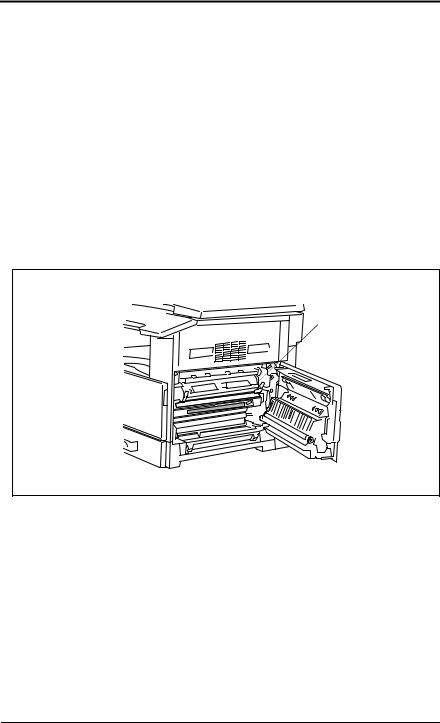
SAFETY AND IMPORTANT WARNING ITEMS
[5] Laser Safety
•This is a digital machine certified as a Class 1 laser product. There is no possibility of danger from a laser, provided the machine is serviced according to the instruction in this manual.
5.1Internal Laser Radiation
semiconductor laser |
|
|
|
|
|
Maximum power of the laser diode |
|
5 mW |
|
|
|
Maximum average radiation power (*) |
|
6.32 µW |
|
|
|
Wavelength |
|
770-795 nm |
|
|
|
*at laser aperture of the Print Head Unit |
|
|
•This product employs a Class 3B laser diode that emits an invisible laser beam. The laser diode and the scanning polygon mirror are incorporated in the print head unit.
•The print head unit is NOT A FIELD SERVICEABLE ITEM. Therefore, the print head unit should not be opened under any circumstances.
Laser Aperture of
the Print Head Unit
A09AP0C501DA
S-13
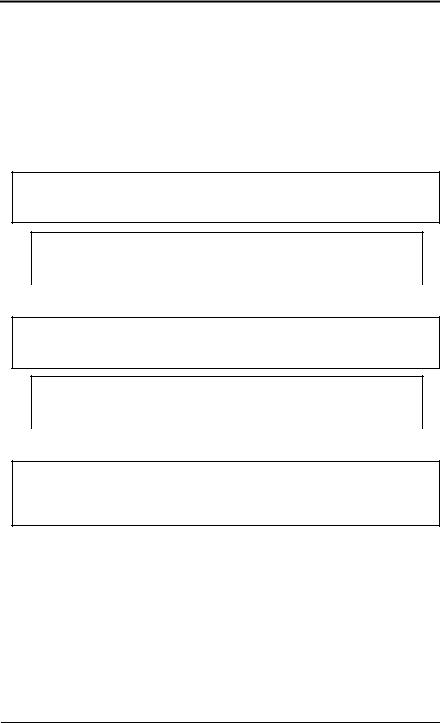
SAFETY AND IMPORTANT WARNING ITEMS
U.S.A., Canada
(CDRH Regulation)
•This machine is certified as a Class 1 Laser product under Radiation Performance Standard according to the Food, Drug and Cosmetic Act of 1990. Compliance is mandatory for Laser products marketed in the United States and is reported to the Center for Devices and Radiological Health (CDRH) of the U.S. Food and Drug Administration of the U.S. Department of Health and Human Services (DHHS). This means that the device does not produce hazardous laser radiation.
•The label shown on page S-16 indicates compliance with the CDRH regulations and
must be attached to laser products marketed in the United States.
.
CAUTION
•Use of controls, adjustments or performance of procedures other than those specified in this manual may result in hazardous radiation exposure.
semiconductor laser
Maximum power of the laser diode |
5 mW |
|
|
Wavelength |
770-795 nm |
|
|
All Areas
CAUTION
•Use of controls, adjustments or performance of procedures other than those specified in this manual may result in hazardous radiation exposure.
semiconductor laser
Maximum power of the laser diode |
5 mW |
|
|
Wavelength |
770-795 nm |
|
|
Denmark
ADVARSEL
•Usynlig laserstråling ved åbning, når sikkerhedsafbrydere er ude af funktion. Undgå udsættelse for stråling. Klasse 1 laser produkt der opfylder IEC60825-1 sikkerheds kravene.
|
halvlederlaser |
|
|
|
|
Laserdiodens højeste styrke |
|
5 mW |
|
|
|
bølgelængden |
|
770-795 nm |
|
|
|
S-14
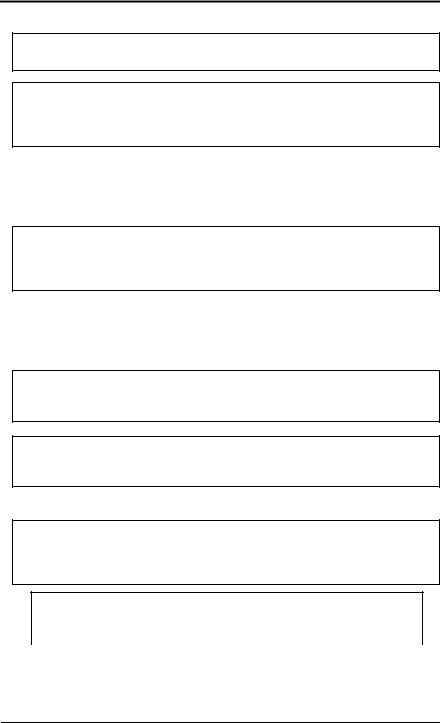
SAFETY AND IMPORTANT WARNING ITEMS
Finland, Sweden
LUOKAN 1 LASERLAITE
KLASS 1 LASER APPARAT
VAROITUS!
•Laitteen käyttäminen muulla kuin tässä käyttöohjeessa mainitulla tavalla saattaa altistaa käyttäjän turvallisuusluokan 1 ylittävälle näkymättömälle lasersäteilylle.
|
puolijohdelaser |
|
|
|
|
Laserdiodin suurin teho |
|
5 mW |
|
|
|
aallonpituus |
|
770-795 nm |
|
|
|
VARNING!
•Om apparaten används på annat sätt än i denna bruksanvisning specificerats, kan användaren utsättas för osynlig laserstrålning, som överskrider gränsen för laserklass 1.
halvledarlaser |
|
|
|
|
|
Den maximala effekten för laserdioden |
|
5 mW |
|
|
|
våglängden |
|
770-795 nm |
|
|
|
VARO!
•Avattaessa ja suojalukitus ohitettaessa olet alttiina näkymättomälle lasersäteilylle. Älä katso säteeseen.
VARNING!
•Osynlig laserstråining när denna del är öppnad och spärren är urkopplad. Betrakta ej stråien.
Norway
ADVERSEL
•Dersom apparatet brukes på annen måte enn spesifisert i denne bruksanvisning, kan brukeren utsettes för unsynlig laserstrålning, som overskrider grensen for laser klass 1.
halvleder laser
Maksimal effekt till laserdiode |
5 mW |
|
|
bølgelengde |
770-795 nm |
|
|
S-15
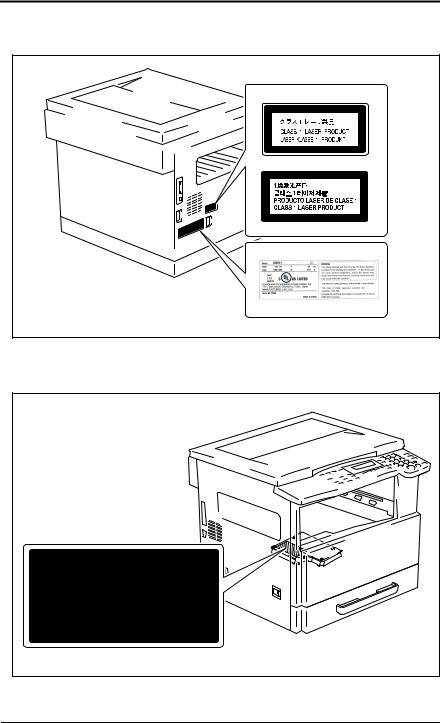
SAFETY AND IMPORTANT WARNING ITEMS
5.2Laser Safety Label
• A laser safety label is attached to the inside of the machine as shown below.
A09AP0E505DA |
5.3Laser Caution Label
• A laser caution label is attached to the outside of the machine as shown below.
A09AP0C503DA |
S-16 |

SAFETY AND IMPORTANT WARNING ITEMS
5.4PRECAUTIONS FOR HANDLING THE LASER EQUIPMENT
•When laser protective goggles are to be used, select ones with a lens conforming to the above specifications.
•When a disassembly job needs to be performed in the laser beam path, such as when working around the printerhead and PC drum, be sure first to turn the printer OFF.
•If the job requires that the printer be left ON, take off your watch and ring and wear laser protective goggles.
•A highly reflective tool can be dangerous if it is brought into the laser beam path. Use utmost care when handling tools on the user’s premises.
•The Print head is not to be disassembled or adjusted in the field. Replace the unit or Assembly including the control board. Therefore, remove the laser diode, and do not perform control board trimmer adjustment.
S-17
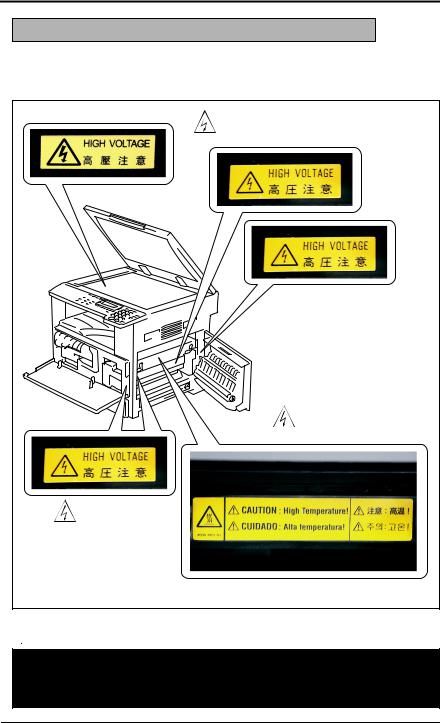
SAFETY AND IMPORTANT WARNING ITEMS
WARNING INDICATIONS ON THE MACHINE
Caution labels shown are attached in some areas on/in the machine.
When accessing these areas for maintenance, repair, or adjustment, special care should be taken to avoid burns and electric shock.
High voltage |
High temperature |
High voltage |
A09AP0C504DA |
 CAUTION:
CAUTION:
•You may be burned or injured if you touch any area that you are advised not to touch by any caution label. Do not remove caution labels. If any caution label has come off or soiled and therefore the caution cannot be read, contact our service office.
S-18

MEASURES TO TAKE IN CASE OF AN ACCIDENT
MEASURES TO TAKE IN CASE OF AN ACCIDENT
1.If an accident has occurred, the distributor who has been notified first must immediately take emergency measures to provide relief to affected persons and to prevent further damage.
2.If a report of a serious accident has been received from a customer, an on-site evaluation must be carried out quickly and KMBT must be notified.
3.To determine the cause of the accident, conditions and materials must be recorded through direct on-site checks, in accordance with instructions issued by KMBT.
4.For reports and measures concerning serious accidents, follow the regulations specified by every distributor.
S-19

MEASURES TO TAKE IN CASE OF AN ACCIDENT
Blank Page
S-20

Composition of the service manual
This service manual consists of Theory of Operation section and Field Service section to explain the main machine and its corresponding options.
Theory of Operation section gives, as information for the CE to get a full understanding of the product, a rough outline of the object and role of each function, the relationship between the electrical system and the mechanical system, and the timing of operation of each part.
Field Service section gives, as information required by the CE at the site (or at the customer’s premise), a rough outline of the service schedule and its details, maintenance steps, the object and role of each adjustment, error codes and supplementary information.
The basic configuration of each section is as follows. However some options may not be applied to the following configuration.
<Theory of Operation section>
OUTLINE: |
Explanation of system configuration, |
|
product specifications, unit configuration, and paper path |
COMPOSITION/OPERATION: Explanation of configuration of each unit, |
|
|
operating system, and control system |
<Field Service section> |
|
GENERAL: |
Explanation of system configuration, and product |
|
specifications |
MAINTENANCE: |
Explanation of service schedule, maintenance steps, ser- |
|
vice tools, removal/reinstallation methods of major parts, |
|
and firmware version up method etc. |
ADJUSTMENT/SETTING: |
Explanation of utility mode, service mode, and mechanical |
|
adjustment etc. |
TROUBLESHOOTING: |
Explanation of lists of jam codes and error codes, and |
|
their countermeasures etc. |
APPENDIX: |
Parts layout drawings, connector layout drawings, timing |
|
chart, overall layout drawing are attached. |
C-1

Notation of the service manual
A. Product name
In this manual, each of the products is described as follows:
(1) |
bizhub 163/211/220: |
Main body |
(2) |
Microsoft Windows 98: |
Windows 98 |
|
Microsoft Windows Me: |
Windows Me |
|
Microsoft Windows NT 4.0: |
Windows NT 4.0 or Windows NT |
|
Microsoft Windows 2000: |
Windows 2000 |
|
Microsoft Windows XP: |
Windows XP |
When the description is made in combination of the OS’s mentioned above: Windows 98/Me
Windows NT 4.0/2000
Windows NT/2000/XP
Windows 98/Me/ NT/2000/XP
B. Brand name
The company names and product names mentioned in this manual are the brand name or the registered trademark of each company.
C. Feeding direction
•When the long side of the paper is parallel with the feeding direction, it is called short edge feeding. The feeding direction which is perpendicular to the short edge feeding is called the long edge feeding.
•Short edge feeding will be identified with [S (abbreviation for Short edge feeding)] on the paper size. No specific notation is added for the long edge feeding.
When the size has only the short edge feeding with no long edge feeding, [S] will not be added to the paper size.
<Sample notation>
Paper size |
Feeding direction |
Notation |
|
|
|
|
|
A4 |
Long edge feeding |
A4 |
|
|
|
||
Short edge feeding |
A4S |
||
|
|||
|
|
|
|
A3 |
Short edge feeding |
A3 |
|
|
|
|
C-2
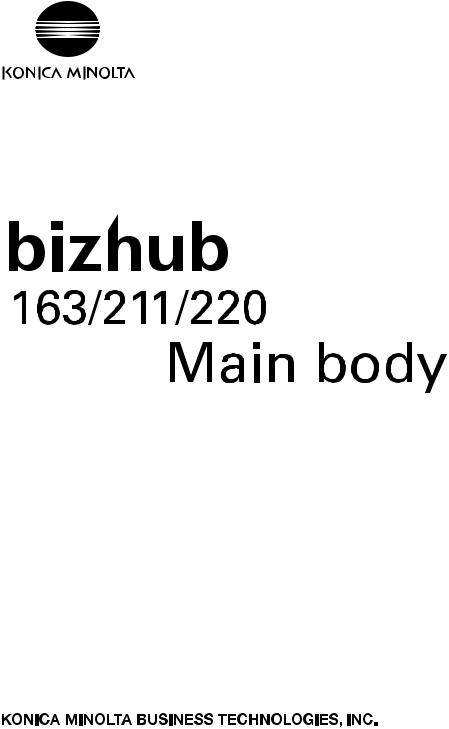
SERVICE MANUAL |
FIELD SERVICE |
|
|
|
|
|
|
|
|
|
|
2007.04 Ver. 1.0

After publication of this service manual, the parts and mechanism may be subject to change for improvement of their performance.
Therefore, the descriptions given in this service manual may not coincide with the actual machine.
When any change has been made to the descriptions in the service manual, a revised version will be issued with a revision mark added as required.
Revision mark: |
|
|
|
|
|
• |
To indicate clearly a section revised, show |
1 |
to the left of the revised section. |
||
|
A number within |
1 |
represents the number of times the revision has been made. |
||
• |
To indicate clearly a section revised, show |
1 |
in the lower outside section of the correspond- |
||
|
ing page. |
|
|
|
|
|
A number within |
1 |
represents the number of times the revision has been made. |
||
NOTE
Revision marks shown in a page are restricted only to the latest ones with the old ones deleted.
•When a page revised in Ver. 2.0 has been changed in Ver. 3.0:
The revision marks for Ver. 3.0 only are shown with those for Ver. 2.0 deleted.
•When a page revised in Ver. 2.0 has not been changed in Ver. 3.0: The revision marks for Ver. 2.0 are left as they are.
2007/04 |
1.0 |
— |
Issue of the first edition |
|
|
|
|
Date |
Service manual Ver. |
Revision mark |
Descriptions of revision |
|
|
|
|
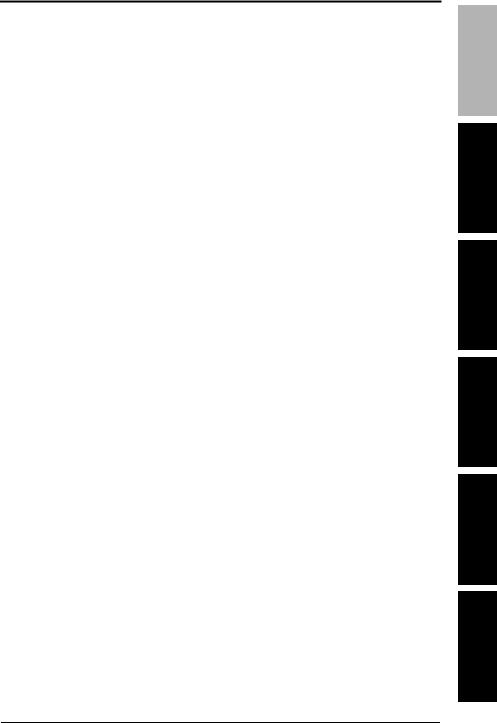
Field Service Ver. 1.0 Apr. 2007
CONTENTS
bizhub 163/211/220 Main body
General
1. |
System configuration............................................................................................... |
1 |
2. |
Product specification ............................................................................................... |
3 |
2.1 Fax kit (FK-506): (Option) ..................................................................................... |
6 |
|
Maintenance
3. |
Periodical check ...................................................................................................... |
7 |
|
3.1 |
Service schedule .................................................................................................. |
7 |
|
3.1.1 |
Main body (bizhub 163) /PF-502/MB-501 ..................................................... |
7 |
|
3.1.2 |
Main body (bizhub 211/220) /PF-502/MB-501 .............................................. |
7 |
|
3.1.3 |
DF-502 .......................................................................................................... |
7 |
|
3.1.4 |
DF-605 .......................................................................................................... |
7 |
|
3.2 |
Maintenance items................................................................................................ |
8 |
|
3.2.1 |
Parts to be replaced by users (CRU) ............................................................ |
8 |
|
3.2.2 |
Periodical parts replacement/cleaning 1 (per 30,000-original feed).............. |
8 |
|
3.2.3 |
Periodical parts replacement/cleaning 2 (per 40,000-original feed).............. |
8 |
|
3.2.4 |
Periodical parts replacement/cleaning 3 (per 50,000-original feed).............. |
9 |
|
3.2.5 |
Periodical parts replacement/cleaning 4 (per 80,000-print) .......................... |
9 |
|
3.2.6 |
Periodical parts replacement/cleaning 5 (per 120,000-original feed)............ |
9 |
|
3.2.7 |
Periodical parts replacement/cleaning 6 (per 150,000-print) ...................... |
10 |
|
3.2.8 |
Periodical parts replacement/cleaning 7 (per 200,000-original feed).......... |
10 |
|
3.3 |
Maintenance parts .............................................................................................. |
11 |
|
3.3.1 |
Replacement parts...................................................................................... |
11 |
|
3.3.2 |
Cleaning parts............................................................................................. |
13 |
|
3.4 Concept of parts life............................................................................................ |
14 |
||
3.5 Maintenance procedure (periodical check parts)................................................ |
15 |
||
3.5.1 |
Cleaning of the original glass and original scanning glass ......................... |
15 |
|
3.5.2 |
Replacing the separation roller assy ........................................................... |
15 |
|
3.5.3 |
Replacing the feed roller ............................................................................. |
17 |
|
3.5.4 |
Replacing the paper dust remover assy...................................................... |
18 |
|
3.5.5 |
Replacing the toner bottle ........................................................................... |
18 |
|
3.5.6 |
Replacing the imaging unit.......................................................................... |
20 |
|
3.5.7 |
Disassembly of the imaging unit ................................................................. |
20 |
|
3.5.8 |
Replacing the PC drum............................................................................... |
22 |
|
bizhub 163/211/220
General
Troubleshooting Adjustment / Setting Maintenance
Appendix
i
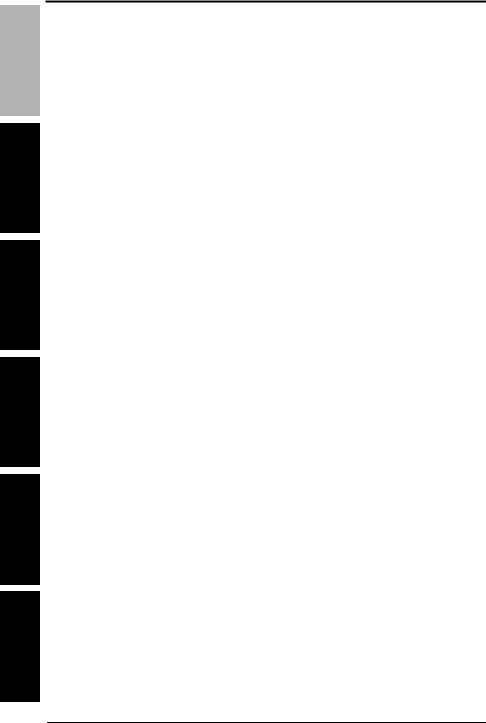
bizhub 163/211/220
General
Troubleshooting Adjustment / Setting Maintenance
Appendix
Field Service Ver. 1.0 Apr. 2007
3.5.9 |
Replacing the ozone filter ........................................................................... |
23 |
|
3.5.10 |
Replacing the PC drum charge corona assy .............................................. |
24 |
|
3.5.11 |
Replacing the cleaning blade ...................................................................... |
24 |
|
3.5.12 |
Cleaning of the PC drum paper separator fingers ...................................... |
25 |
|
3.5.13 |
Cleaning of the Ds collars ........................................................................... |
25 |
|
3.5.14 |
Cleaning of the developer scattering prevention plate ................................ |
26 |
|
3.5.15 |
Replacing the developer / toner agitating seal ............................................ |
27 |
|
3.5.16 |
Cleaning of the pre - image transfer guide plate ........................................... |
29 |
|
3.5.17 |
Replacing the image transfer roller assy ..................................................... |
30 |
|
3.5.18 |
Replacing the fusing unit ............................................................................ |
30 |
|
4. |
Service tool ........................................................................................................... |
32 |
|
4.1 |
Service material list ............................................................................................ |
32 |
|
4.2 |
CE tool list .......................................................................................................... |
32 |
|
5. |
Firmware upgrade................................................................................................. |
33 |
|
5.1 Preparations for firmware rewriting..................................................................... |
33 |
||
5.1.1 |
Installing the driver ...................................................................................... |
33 |
|
5.2 |
Firmware rewriting.............................................................................................. |
35 |
|
5.2.1 |
Updating method ........................................................................................ |
35 |
|
5.2.2 |
Procedure when upgrading the firmware has failed .................................... |
37 |
|
6. |
Other |
..................................................................................................................... |
39 |
6.1 |
Disassembly/adjustment ..........................................................prohibited items |
39 |
|
6.2 Disassembly/assembly/cleaning ..............................................list (other parts) |
40 |
||
6.2.1 ................................................................. |
Disassembly/assembly parts list |
40 |
|
6.2.2 ....................................................................................... |
Cleaning parts list |
41 |
|
6.3 |
Disassembly/assembly ......................................................................procedure |
42 |
|
6.3.1 ........................................................ |
Original glass/Original scanning glass |
42 |
|
6.3.2 .............................................................................................. |
Control panel |
42 |
|
6.3.3 .................................................................................................. |
Front cover |
43 |
|
6.3.4 .......................................................................................... |
Paper exit cover |
44 |
|
6.3.5 ................................................................................................... |
Front door |
44 |
|
6.3.6 .......................................................................................................... |
Tray 1 |
44 |
|
6.3.7 .................................................................................................... |
Left cover |
45 |
|
6.3.8 ............................................................................................. |
Paper exit tray |
45 |
|
6.3.9 ........................................................................................ |
Rear inside cover |
46 |
|
6.3.10 ......................................................................................... |
Upper rear cover |
46 |
|
6.3.11 ............................................................................................. |
Left rear cover |
47 |
|
6.3.12 .................................................................................................. |
Rear cover |
47 |
|
6.3.13 .......................................................................................... |
Right rear cover |
47 |
|
ii
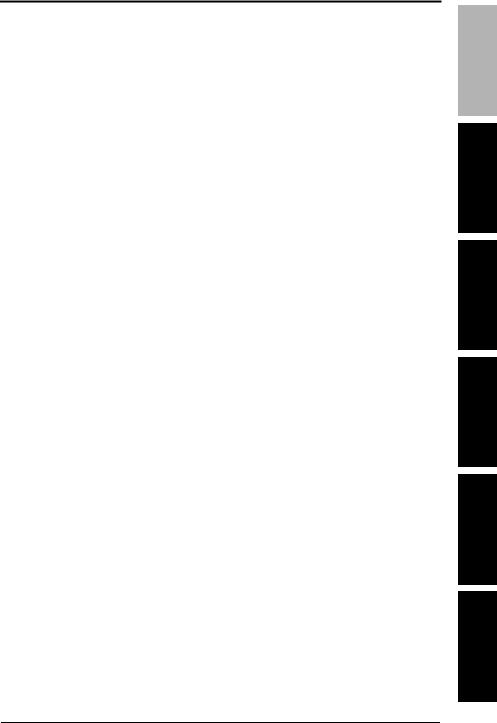
Field Service Ver. 1.0 Apr. 2007 |
|
|
6.3.14 |
Rear right cover........................................................................................... |
48 |
6.3.15 |
Right cover .................................................................................................. |
48 |
6.3.16 |
Printer control board (PRCB) ...................................................................... |
48 |
6.3.17 |
MFP board (MFPB)..................................................................................... |
49 |
6.3.18 |
High voltage unit (HV1) ............................................................................... |
50 |
6.3.19 |
Power supply unit (DCPU) .......................................................................... |
51 |
6.3.20 |
Paper size detect board (PSDTB)............................................................... |
53 |
6.3.21 |
Heater relay board (RYB): 200 V areas only............................................... |
54 |
6.3.22 |
Pre-image transfer register board (PITRB) ................................................. |
54 |
6.3.23 |
Manual bypass tray ..................................................................................... |
55 |
6.3.24 |
Toner hopper unit/Toner replenishing motor (M2) ....................................... |
55 |
6.3.25 |
PH unit ........................................................................................................ |
57 |
6.3.26 |
Disassembly of the fusing unit .................................................................... |
58 |
6.3.27 |
CCD unit ..................................................................................................... |
61 |
6.3.28 |
Scanner, exposure lamp, and inverter board (PU2).................................... |
63 |
6.3.29 |
Scanner motor (M4) .................................................................................... |
65 |
6.3.30 |
Scanner drive cables................................................................................... |
66 |
6.3.31 |
Main motor (M1).......................................................................................... |
76 |
6.3.32 |
Power unit cooling fan motor (FM2) ............................................................ |
77 |
6.3.33 |
Fusing cooling fan motor (FM1) .................................................................. |
78 |
6.3.34 |
Paper size sensor (S5) assy ....................................................................... |
79 |
6.3.35 |
Fusing unit interlock switch (S2) ................................................................. |
80 |
6.3.36 |
Inch/metric sensor/1 (PS7) assy (3rd area only)......................................... |
83 |
6.3.37 |
Flickerless resistor (R1) (Only for 200 V areas of bizhub 163) ................... |
83 |
6.3.38 |
Replacing the TCR sensor (TCRS)............................................................. |
84 |
6.3.39 |
Application of toner ..................................................................................... |
85 |
6.4 Cleaning procedure ............................................................................................ |
86 |
|
6.4.1 |
Separation roller.......................................................................................... |
86 |
6.4.2 |
Feed roller ................................................................................................... |
87 |
6.4.3 |
Upper/Lower Synchronizing Rollers............................................................ |
87 |
6.4.4 |
Paper dust remover..................................................................................... |
88 |
6.4.5 |
Bypass transport roller/roll .......................................................................... |
88 |
6.4.6 |
Mirrors......................................................................................................... |
89 |
6.4.7 |
Lens ............................................................................................................ |
89 |
6.4.8 |
CCD Sensor................................................................................................ |
90 |
6.4.9 |
Scanner rails/bearings ................................................................................ |
91 |
6.4.10 |
PH window .................................................................................................. |
91 |
bizhub 163/211/220
General
Troubleshooting Adjustment / Setting Maintenance
Appendix
iii
